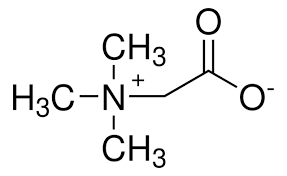Pharmaceutical & Fine Chemicals
Betaine

Product Description
Betaine, also known as trimethylglycine, is a naturally occurring compound with diverse industrial applications.
Product:
Betaine
CAS:
107-43-7
Synonym:
Trimethylglycine; Carboxymethyl)trimethylammonium inner salt; Oxyneurine
Structure:

Typical Characteristics
Appearance
White powder or crystals
Density
1.00 g/cm3
Melting point
310 °C (dec.)
Molecular Weight
117.15
Purity
≥98%
Refractive index
1.4206
Uses, Applications & Markets
Key applications
get a quote



Betaine used in many
industry applications
Betaine, also known as trimethylglycine, is a naturally occurring compound with diverse industrial applications. Here are some of its key uses:
- Feed Additive: Betaine is commonly added to animal feed as a feed additive to improve digestion, nutrient absorption, and overall animal health. It helps optimize nutrient utilization and can enhance growth performance in livestock and poultry.
- Personal Care Products: It is utilized in the formulation of personal care products such as shampoos, conditioners, and skin creams due to its moisturizing and conditioning properties. Betaine helps hydrate and soften the skin and hair, making it a popular ingredient in cosmetic formulations.
- Food Industry: Betaine is used in the food industry as a flavor enhancer, stabilizer, and humectant. It can improve the texture, flavor, and shelf life of various food products, including baked goods, beverages, sauces, and dressings.
- Detergents and Cleaners: Betaine is added to detergents and cleaners as a surfactant and foam booster. It helps lift dirt and grease from surfaces and contributes to the formation of stable foam, making it effective in household and industrial cleaning products.
- Health Supplements: Betaine supplements are consumed for their potential health benefits, including support for liver function, cardiovascular health, and athletic performance. It is often included in pre-workout supplements due to its role in cellular hydration and energy metabolism.
- Industrial Applications: Betaine is used in various industrial processes, including pharmaceutical manufacturing, textile processing, and water treatment. It can serve as a stabilizer, buffering agent, or viscosity modifier in different applications.
- Animal Nutrition: In addition to its use as a feed additive, betaine is also used in aquaculture to improve the growth performance and stress tolerance of fish and crustaceans. It helps maintain osmotic balance and supports metabolic functions in aquatic species.
- Medical Applications: Betaine has pharmaceutical applications and is used in the production of certain medications. It may be included in formulations for treating conditions such as homocystinuria, a metabolic disorder characterized by elevated levels of homocysteine in the blood.